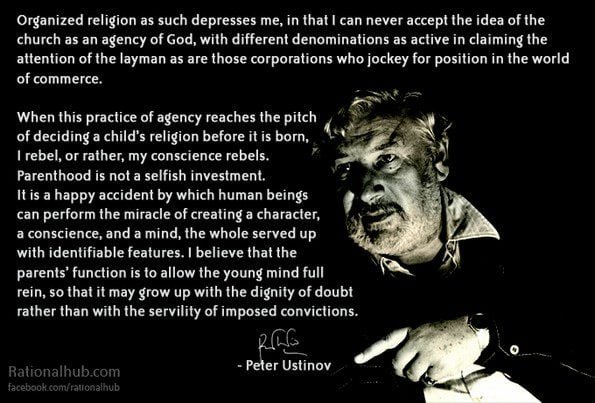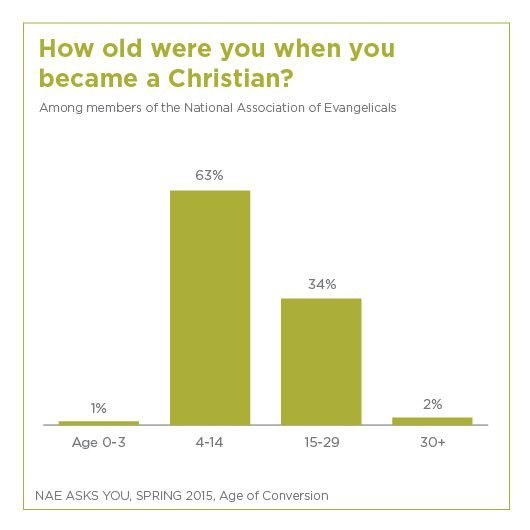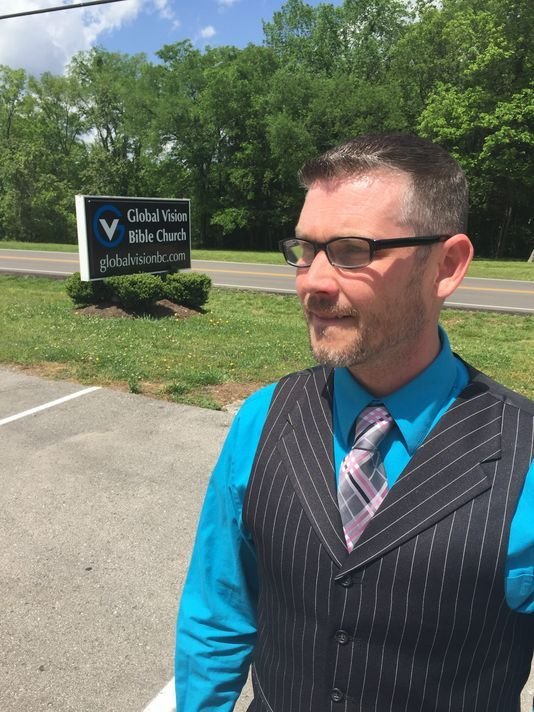
Most American children do not choose which, if any, religion they want to follow. (Please see Why Most Americans are Christian.) Children, almost without exception, adopt the religion of their parents and family. Often, religious worship is part of the ebb and flow of family and community life, so it should come as no surprise that children embrace that religion. And therein lies the problem. Most Americans believe that worshiping God is important, and many of them take it a step further in believing that it is essential that their children worship a specific God, namely the Christian God.
In most Christian sects, children are encouraged to make a conscious choice to worship Jesus. In the Catholic church, children, often as young as 7 years old, go through the sacraments of initiation: baptism, confirmation, and Eucharist. In the Lutheran church, children, usually around the age of 12, go through the rite of confirmation. In the Evangelical church, children are encouraged to accept Jesus as their Lord and Savior. It is not uncommon to hear adult Evangelicals say that Jesus saved them when they were 5 or 6 years old. In the Baptist church, it is not uncommon to hear testimonies of youthful conversion and a re-dedication to that conversion during teenage years.
Regardless of the Christian sect and its initiation practice, young children are encouraged, and often expected, to embrace the tribal God. Many secularists, including myself, think that children should not make the choice of a particular religion until they are old enough to rationally do so, say, teenage years or older. If, as most Christians say, believing in and worshiping Jesus is vitally important, then shouldn’t children wait to embrace Christianity until their reasoning skills are such that they can intellectually understand what it means to be a follower of Jesus and a member of a particular church?
Many Christian sects either baptize or dedicate infants, resulting in that particular sect putting its mark upon the infant. They are saying, in effect, this baby is ours. From that point forward, children are indoctrinated in their parent’s religion. While many Christian sects hide their motivations for indoctrinating young children, Evangelical groups such as Child Evangelism Fellowship (CEF), are quite clear about why they go after young children. Thirty years ago, David Shibley, a proponent of CEF methodology, wrote about the importance of evangelizing children:
I want my two young sons to have bland testimonies – no sensational stories about rescue from drugs, perversion and rebellion.
I want it to be natural for them to trust the Lord Jesus early for salvation and then to trust Him for everything thereafter. I believe in the validity of child evangelism.
For one thing, statistics are on its side. 19 out of 20 Christians receive Christ before the age of 25. After that, the odds against conversion become astronomical.
Early conversion saves not only a soul, but potentially points an entire life toward service to God and man. In 15 years of ministry I’ve met no one who is sorry he came to Christ early in life. I’ve encountered many who are sorry they didn’t….
Shortly before his second-century martyrdom at age 95, Polycarp said, “86 years have I served the Lord.” 18th Bible expositor Matthew Henry was converted at the age of six, hymnwriter Isaac Watts at nine.
W.A. Criswell, pastor of the large First Baptist Church of Dallas, Texas, was saved when he was eight. Evangelist Stephen Olford came to Christ on his 7th birthday.
65% of those enrolled in America’s largest seminary Southwestern Baptist Theological Seminary were converted before their teens.
Children are reached more easily than adults. Jay Kesler, president of Youth for Christ International, has well said, “Any evangelism after high school isn’t evangelism. It’s really salvage.”
Young children are notably tender. Their sincerity is never in doubt. Their heart attitudes contribute to genuine conversion. And Jesus told adults that they must become as children to experience the new birth (Matt. 18:3).
True, children who make an early profession of faith sometimes struggle with assurance and make a second public commitment later. They often say, “I didn’t know what I was doing the first time.” More likely, however, the personal worker attending the child didn’t know what he was doing.
We need not fully understand the Gospel to be saved; we need only believe and receive it. What adult fully comprehends the rationale or the magnitude of redemption?
Some argue that children are unable to stay true to their commitment. Yet the late English preacher Charles Spurgeon noted, “Out of a church of 2,700 members, I have never had to exclude a single one who was received while yet a child. Teachers and superintendents should not merely believe in the possibility of early conversion, but in the ferquency (sic) of it.”
Child evangelism assists in the formation of character. The Bible clearly teaches that man’s only capability for good lies in the imputed righteousness of Christ. We do not expect unconverted adults to act like Christians. The same should be true for children.
Christians seem to be the only ones who believe they should wait to influence children’s minds. Advertisers don’t wait. Child abusers don’t wait. Neither do humanist educators, false religions and cults, or Satan.
The church that reaches its children has a better chance of reaching its adults. Often newly-converted children win their parents and grandparents to the Lord. Those children grow up to be adults who can nurture their own families to faith in Jesus Christ.
Lest we forget, Christianity is always just one generation from extinction. We must reach the coming generation with the Gospel.
The late G. Campell (sic) Morgan, for many years pastor of London’s Westminster Chapel, said that the church that always seeks the child is the church that is “seeking the Kingdom … A vision of the desire for the Kingdom of God is the master passion in all work for children.”
Trudi Bils, wife of Steve Bils, the one-time executive director for CEF in Northern Colorado, wrote an article in 1990 for the Grace in Focus Newsletter titled “Can Children Be Saved?” detailing the importance of evangelizing children when they are young:
To many of us, this is a ridiculous question. For in fact, we were saved as children. Statistics are on our side as well, revealing that 85% of Christians made the decision to trust Christ somewhere between the ages of four and fourteen. Further, those of us who have been actively learning and practicing the discipline of soul-winning have probably led a child to Christ, perhaps even one of our own….
Though some have tried to alter or add to the meaning of the word believe (mentioned as the sole condition for salvation over 150 times in the New Testament), its definition remains as God intended it. “What faith really is, in biblical language, is receiving the testimony of God. It is the inward conviction that what God says to us in the Gospel is true. Faith is… taking God at His word. It is nothing less than this. But it is also nothing more.”
This is a message that is all inclusive — no strings attached. Even, and especially, a child can grasp this message and place his faith in Christ for eternal life, and many do.
R. A. Torrey said, “It is almost the easiest thing in the world to lead a child from five to ten years of age to a definite acceptance of Christ. . . . The younger the children are when you seek to lead them to make an actual acceptance of Christ, the easier the work will be, and the more satisfactory” (from Frank G. Coleman’s, The Romance of Winning Children [Cleveland, OH: Union Gospel Press, 1973], p. 14). Thank God for the faithful witnesses who led me–and perhaps you–to Christ at an early age!
Sam Doherty, a man who has dedicated his entire life to evangelizing children, wrote a handbook for Child Evangelism Fellowship titled U Can Lead Children to Christ: A Step by Step Guide for Counsellors of Children (link no longer active). Doherty lists four reasons why it is imperative that Christians evangelize children:
- Children can be saved
- Children need to be saved
- Children are open to the gospel
- A Child Saved is a Life Saved
According to Doherty:
- They (children) are spiritually dead
- They have a sinful nature which shows itself in
sinful acts - They are outside God’s Kingdom
- If they have reached the age of accountability
they are under God’s condemnation
Doherty believes that once children reach the age of accountability, the age when children know the difference between right and wrong, they are in danger of going to Hell if they don’t accept Jesus as their Savior. What parent wants his or her child to go to Hell, right? So then, it should come as no surprise that many Evangelicals press their children to profess faith in Jesus at a very young age.

Let me give you an example of how this works in the Evangelical church. Ron Adkins was the pastor of the Methodist church a few blocks from my home. This church was the last church my wife and I attended before we deconverted in 2008. According to Ron’s bio on the Ney/Farmer United Methodist Church website, he was saved at the age of seven and his wife asked Jesus into her heart at age eight. Should it come as any surprise, then, that all four of the Adkins’ children were saved at age five?
In the type of Baptist churches in which my wife and I grew up, children are sent to Sunday school and children’s church so they can be exposed to the church’s teachings on Heaven, Hell, Jesus, salvation, death, and God’s judgment. Children are often emotionally and mentally coerced into asking Jesus into their hearts. Children’s church teachers will often ask their young pupils: do you want to go to Hell when you die? or how many of you want to go to Heaven when you die? What young, immature and impressionable child doesn’t want to avoid the flames of Hell or enjoy the wonders of Heaven?
In many ways, Evangelicals who evangelize children are like door-to-door salesmen selling their customers on the importance of owning their product and the danger of putting off a buying decision to another day. Years ago, I sold Kirby vacuüm cleaners. I would praise the virtues of the grossly overpriced vacuum, trying to get prospective customers to see how much better their lives would be if their households owned a Kirby. If the positive approach failed to work, I’d resort to the methods meant to show them how poorly their current vacuüm was working. I’d even go so far as to use my demo Kirby vacuüm to sweep the prospective customer’s bed, showing them all the dead skin and “mites” the mighty Kirby removed from their bed. The goal was always to get the customer to make an impulsive decision. And this is exactly what happens in many Evangelical churches. Uninformed children are wowed with the wonders of Heaven and threatened with the horrors of sin and Hell. Most children who are exposed to these kinds of sales techniques will “choose” to get saved.
Once children are saved, their parents and churches continue to indoctrinate them in their sect’s particular teachings. Remember, these children do not have the rational capacity to make this choice, nor have they been exposed to alternative religions. Are confirmed, initiated, or saved children really making an informed decision to believe the central tenets of Christianity? Of course not. They lack the requisite intellectual skills necessary to make such a decision. Wouldn’t it be better to expose children to a variety of religions, along with humanism and atheism, and allow them to make a reasoned choice of which to follow when they are old enough to do so?
Unfortunately, what is best for children often collides with the objectives of organized religion: increasing membership and income. To put it bluntly, the goal is asses in the seats and money in the offering plate. Without a steady stream of people who were indoctrinated as children and teenagers, churches would suffer declines in attendance and offerings. While Christian sects, churches, and parents argue that they are most interested in making sure children believe in Jesus, the truth is that they know without young, impressionable, and easily-manipulated children being assimilated into the church, Christianity would die. If they wait until children are in their teens to indoctrinate them in the ways of Jesus, they know they run a huge risk of children leaving the church when they reach adulthood.
In fact, things are so bad for American Christian churches that adults, despite being immersed in the teachings of Christianity, are leaving the church anyway. The percentage of “nones”— those with no religious identification — and the increase in the indifference of young adults towards religion has resulted in much hand-wringing in the Christian community. What should we do, pastor after pastor asks. Our churches are getting increasingly older and young adults are leaving and never coming back. These pastors know that if they don’t do something to stem to tide of young adult membership loss, their churches will close and they will be forced to get real jobs.
What prompted me to write this post is an article on ESPN about whether children should be permitted to play high-impact sports. Dr. Bennet Omalu, “the first to publish findings linking head injuries, particularly concussions, to the development of chronic traumatic encephalopathy in football players,” thinks children should not be permitted to play high-impact sports “until they reach the legal age of consent, usually 18.” In a New York Times article on the subject, Dr. Omalu states:
Our children are minors who have not reached the age of consent. It is our moral duty as a society to protect the most vulnerable of us. The human brain becomes fully developed at about 18 to 25 years old. We should at least wait for our children to grow up, be provided with the information and education on the risk of play, and let them make their own decisions. No adult, not a parent or a coach, should be allowed to make this potentially life-altering decision for a child.
We have a legal age for drinking alcohol; for joining the military; for voting; for smoking; for driving; and for consenting to have sex. We must have the same when it comes to protecting the organ that defines who we are as human beings.
If children are not old enough to understand the risks of playing football, and, as Dr. Omalu says, if they should be prohibited from playing it until age 18, shouldn’t the same hold true for indoctrinating children in the teachings and practices of a particular religion? Shouldn’t they be of age and have all the relevant facts before they make a decision to embrace a God, or no deity at all?
While it is naïve to expect Christian parents to keep their children away from their tribe’s religion, society should require them to not unduly indoctrinate their children. That we don’t reflects the fact that we give Christianity a pass on almost everything when it comes to children. We allow Christian parents to pull their children out of public schools so they can be indoctrinated by evangelists, posing as teachers of knowledge, for their particular sect’s beliefs. We also allow Christian parents to homeschool their children. Millions of American children are homeschooled or attend Christian private (and parochial) schools. These children are taught reason-defying myths such as the virgin birth of Jesus, the resurrection of Jesus from the dead, and wine and crackers miraculously turning into Jesus’ blood and flesh once they are prayed over. They are regularly reminded that they are sinful, broken humans in need of forgiveness and salvation, and that Heaven awaits them if they believe, and Hell awaits if they don’t. These types of teachings do incalculable emotional harm to children, often resulting in low self-esteem or psychological problems.
Worse yet, these children are taught lies about the natural world they are very much a part of. Many Evangelical homeschool parents and private schools teach children that the earth is 6,023 years old, evolution is a lie, and the teaching of the Bible accurately reflects the one and only way to understand the world. While parents and teachers will most likely teach their wards science, they often teach a Christianized version that repudiates biological evolution. They also, thanks to a literalistic reading of the Bible, reject most of what cosmology, archaeology, and geology tell us about the age of the earth and the universe. As a result, children who have embraced this kind of indoctrination are crippled intellectually. Ask any secular college or university professor how difficult it is to reason with children who have been indoctrinated with Fundamentalist Christian beliefs. The intransigence of these students is heartbreaking. Stunted intellectually, they often go through life ignoring vast swaths of human knowledge because it does not fit the narrow confines of what they were taught as a child. Of course, this is EXACTLY what Christian churches and their leaders desire: intellectually-neutered people who continue to look to them for answers.
Zoltan Istvan, the author of the novel The Transhumanist Wager, believes that it should be illegal to religiously indoctrinate children under the age of 16. In a September 2014 Huffington Post article titled Some Atheists and Transhumanists are Asking: Should it be Illegal to Indoctrinate Kids With Religion? Istvan wrote:
Religious child soldiers carrying AK-47s. Bullying anti-gay Jesus kids. Infant genital mutilation. Teenage suicide bombers. Child Hindu brides. No matter where you look, if adults are participating in dogmatic religions, then they are also pushing those same ideologies onto their kids….
A child’s mind is terribly susceptible to what it hears and sees from parents, family, and social surroundings. When the human being is born, its brain remains in a delicate developmental phase until far later in life.
“Kids are impressionable,” said Dr. Eunice Pearson-Hefty, director of the Teaching Environmental Science program of Texas’ Natural Resource Conservation Commission. “Anything you tell them when they’re real small can have a lasting impression.”
It’s only later, when kids hit their teens that they begin to think for themselves and see the bigger picture. It’s only then they begin to ask whether their parent’s teachings make sense and are correct. However, depending on the power of the indoctrination in their childhood, people’s ability to successfully question anything is likely stifled their entire lives…
…”Religion should remain a private endeavor for adults,” says Giovanni Santostasi, PhD, who is a neuroscientist at Northwestern University Feinberg School of Medicine and runs the 10,000 person strong Facebook group Scientific Transhumanism. “An appropriate analogy of religion is that’s it’s kind of like porn–which means it’s not something one would expose a child to.”
Unfortunately, even though atheists, nonreligious people, and transhumanists number almost a billion people, it’s too problematic and unreasonable to imagine taking “God” and “religion” out of the world entirely. But we do owe it to the children of the planet to let them grow up free from the ambush of belief systems that have a history of leading to great violence, obsessively neurotic guilt, and the oppression of virtually every social group that exists.
Like some other atheists and transhumanists, I join in calling for regulation that restricts religious indoctrination of children until they reach, let’s say, 16 years of age. Once a kid hits their mid-teens, let them have at it–if religion is something that interests them.
16-year-olds are enthusiastic, curious, and able to rationally start exploring their world, with or without the guidance of parents. But before that, they are too impressionable to repeatedly be subjected to ideas that are faith-based, unproven, and historically wrought with danger. Forcing religion onto minors is essentially a form of child abuse, which scars their ability to reason and also limits their ability to consider the world in an unbiased manner. A reasonable society should not have to indoctrinate its children; its children should discover and choose religious paths for themselves when they become adults, if they are to choose one at all.
While I think we are several generations away from neutering the effect religion has on American children, we do owe it to them make sure they are taught to think critically. I’ve long been a proponent of junior high children and older being required to take classes in world religions, logic, and philosophy. This would expose their evolving minds to methodologies and thought processes that will enable them to make informed choices about religion. Doing so will certainly swell the ranks of the non-religious, and it is for this reason the religionists will fight tooth and nail any attempt to remove them as the sole arbiter of religious belief.
The fight is on and I’m convinced that skepticism and reason will win the day.
Notes
Both my wife and I first made professions of faith at age five. As is the custom in Independent Fundamentalist Baptist (IFB) churches, both of us made rededication decisions as teenagers.
Bruce Gerencser, 66, lives in rural Northwest Ohio with his wife of 45 years. He and his wife have six grown children and thirteen grandchildren. Bruce pastored Evangelical churches for twenty-five years in Ohio, Texas, and Michigan. Bruce left the ministry in 2005, and in 2008 he left Christianity. Bruce is now a humanist and an atheist.
Connect with me on social media:
Your comments are welcome and appreciated. All first-time comments are moderated. Please read the commenting rules before commenting.
You can email Bruce via the Contact Form.









